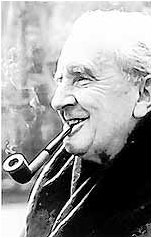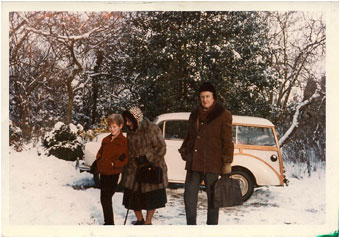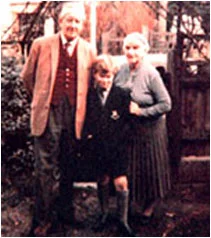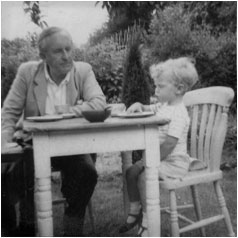This article was first published by The Mail On Sunday 2003. © Simon Tolkien
"My first recollection of My Grandfather is like this: I'm four or five and I'm really scared. He is huge, with a great roar in his voice, and he's coming to get me. I am just about to cry when I see the twinkle in his bright eyes, and realise it's all just fun. On long summer evenings when I was still very small we would play Grandmother's Footsteps in the garden of his house in north Oxford. He would take off his jacket and stand smoking in his velvet waistcoat while I crept up on him through the shadows on the lawn.
He was inseparable from his pipe, which he would constantly relight with Swan Vesta matches. Later he told me he never inhaled, except by accident, when he was riding his bicycle in Oxford and the wind was against him.
I was the only grandchild of my age in the Tolkien family, and this made me quite special to both my grandparents during the last ten years of their lives. It meant a lot to me, as I had quite a lonely childhood after my parents separated when I was five. My father remarried three years later and had children, and my mother was working fulltime as a teacher.
My Grandfather had the knack of being able to talk to a child without seeming like a voice coming from on high. He spent a great deal of time with me and his love and kindness helped me through difficult times. By the time I was nine, my grandparents had moved to Bournemouth. My mother would put me on the train at Oxford and I would somehow arrive at the other end, where I was collected and taken to the Miramar Hotel. Although my grandparents, who were both in their 70s, lived just outside the town, they were regular guests there. My Grandfather understood how much of an adventure these journeys of mine were. Just before a visit in January 1969, he wrote to me describing a solo train journey that he took all the way from Birmingham to Torquay when he was ten and how it made him feel 'rathergrand'.
For a nine-year-old boy, the Miramar was a wonderful place. It was on the seafront and inside there were endless lengths of corridors, a myriad of rooms to explore and a huge sweet trolley. In front of the hotel was a putting green where My Grandfather and I spent many afternoons playing golf, and perhaps that was when I developed my passion for the game.
Beyond the lawn was the sea. My Grandfather was incredibly adept at skimming stones. He could make them leap nine or ten times. Perhaps he just had a good eye for the flat ones.The sea was warm and inviting in the summer but in the winter the guests would stay wrapped up in the hotel. I still have a letter from My Grandfather in which he describes 'a dark afternoon in which great slow waves came silently out of the mist and curled over like oily sea beasts'.
Bournemouth was certainly not My Grandfather's first choice of place to live, and I'm sure he missed Oxford. However, my grandmother loved the Miramar, and My Grandfather wanted to make her happy in the last years of their lives.
I don't remember My Grandfather writing when I went to stay with him. He played endless word games with me and did the Telegraph crossword. While he worked out the clues, he'd embellish the newspaper with exquisite designs. He was capable of extremely minute penwork and once gave me a farthing on which he'd written the entire Lord's Prayer in circular script.
Although The Lord Of The Rings was really taking off in the Sixties, I don't recall having a sense that My Grandfather was a famous person, except for one Guy Fawkes evening when he visited The Dragon, my Oxford prep school, and was immediately mobbed by the boys. I bathed in his reflected glory for a few days after that.
As an only child I was left very much to my own devices and spent vast amounts of time reading everything I could get my hands on. I first read The Lord Of The Rings when I was nine, and from then on it was my favourite book.
For me the test of a good book was whether it could transport me body and soul out of the here and now into a magical new world, and The Lord Of The Rings certainly did that. After I finished reading it, I read it again and all the time I plagued My Grandfather with endless obscure questions about Middle Earth. What went on in the lands to the East of Mordor? Who were the four other wizards to whom My Grandfather alluded? Where were they and what were they doing? I wanted everything to be filled in. My poor grandfather. He did his best. Despite being an old man, he was endlessly patient in answering my questions.
I vividly remember going to church with him in Bournemouth. He was a devout Roman Catholic and it was soon after the Church had changed the liturgy from Latin to English. My Grandfather obviously didn't agree with this and made all the responses very loudly in Latin while the rest of the congregation answered in English. I found the whole experience quite excruciating, but My Grandfather was oblivious. He simply had to do what he believed to be right. He inherited his religion from his mother, who was ostracised by her family following her conversion and then died in poverty when My Grandfather was just 12. I know that he played a big part in the decision to send me to Downside, a Roman Catholic school in Somerset.
My grandmother died two years before My Grandfather and he came back to live in Oxford. Merton College gave him rooms just off the High Street. I went there frequently and he'd take me to lunch in the Eastgate Hotel. Those lunches were rather wonderful for a 12-year-old boy spending time with his grandfather, but sometimes he seemed sad. There was one visit when he told me how much he missed my grandmother. It must have been very strange for him being alone after they had been married for more than 50 years.
A portrait of My Grandfather's grandfather hung over the mantelpiece in the sitting room of his flat in Oxford. When My Grandfather died, I was asked what memento of him I would like and I chose the portrait. Looking at it now brings back My Grandfather's room: the stacks of books and unruly papers; the haze of blue smoke; the exact position of the sofa in relation to the desk. These objects seem almost more vivid now than when My Grandfather was a physical being among them. Perhaps I sensed at the time that he didn't have long to live, although my last memory of My Grandfather was on a summer's day when he was full of life.
We played croquet all afternoon. I'm pretty sure that he won, too. I was 14 when he died. I was in France with my father and I remember how sad I felt, both then and later. I still wish My Grandfather had lived a little longer. Life wasn't great after his death.
My father moved to the South of France with his second family and I hated having to be away at school. I missed My Grandfather very much. My father has always been in charge of My Grandfather's literary estate, and about four years ago he started to think about who would succeed him on the board of the company which administers the Tolkien estate. He named new directors to join him and I was not one of them.
Living in the shadow of The Lord Of The Rings has not been an easy experience and I was always telling myself that I couldn't write fiction. However, I began writing my first novel on January 1, 2000. The first effort was rejected and that was hard, but I was determined to carry on and the result was The Stepmother. I think that My Grandfather would be both pleased and proud that I have become a novelist. My book is a courtroom drama, it could not be further removed from his world of elves and dwarves, but writing it has made me feel close to My Grandfather again. It is as if I have come into my true inheritance."
Article first published by The Mail On Sunday 2003. © Simon Tolkien



